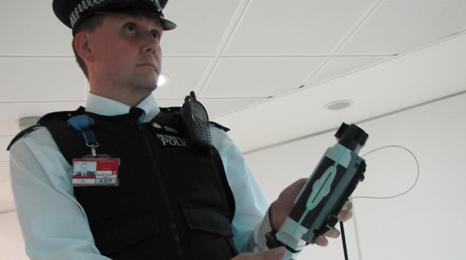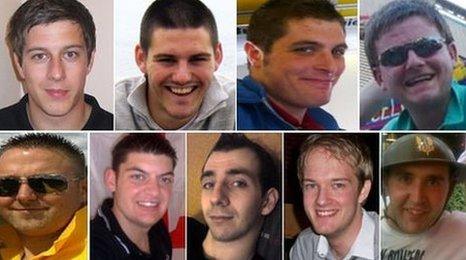Police move to ground World Cup thugs
- Published

England fans might be more worried about Rio's replacement or who is going to play up front with Rooney. But at more than a dozen British airports, the authorities now have their eyes on the bigger picture - possible troublemakers flying out to South Africa.
Police expect between 25,000 and 40,000 fans to make the 11-hour trip to Johannesburg or Cape Town before first round matches kick off on 11 June.
This week sees the start of Operation Mulse. Thousands of travellers will be pulled aside by specialist officers armed with portable scanners linked to the police national computer.
The extra checks are meant to stop any of the 3,143 fans with football banning orders, who haven't already handed over their passports, from making it to South Africa.
Police also have the power to stop anyone they suspect of planning to cause trouble and, based on their criminal record, prevent them from leaving the country.
"The vast majority of supporters are going to South Africa to have a great time and enjoy themselves," said Bryan Drew, the director of the Football Policing Unit.
"You can never be 100% confident, but we have made as many preparations as possible to prevent organised violence and we hope that even if England win all their matches and progress, then the celebratory behaviour is kept within reasonable limits."
Banning orders
Football banning orders are now one of the main weapons the courts use to try to stop people from causing trouble both at domestic matches and when England play abroad.
Fan talks about living with a banning order
They prevent people from setting foot in any domestic football stadium or leaving the country when England are playing away.
Most of the 3,143 people on an active banning order had to surrender their passports by 2 June and will not be able to fly overseas without special permission until the end of the World Cup on 11 July.

England fans' behaviour has improved says Bryan Drew
They also have to appear in person at a local police station on the day of each England game to prove they haven't skipped abroad on false documents.
Officers from the Football Policing Unit say that the "vast majority" of passports were handed in by the deadline and they are now working with local police to track down the rest.
The penalty for ignoring an order is a maximum of six months in prison, a £5,000 fine and an extension of the ban.
"It's a preventative measure to stop a repeat of that behaviour for between three and 10 years," said Bryan Drew at the Football Policing Unit.
"At recent England matches there have been no incidents and no arrests. In fact our supporters are often praised for their behaviour as opposed to a source of national disgrace as they were before."
Others though reckon banning orders might work in the domestic game but are less effective at stopping trouble abroad.
"Most of those people wouldn't have wanted to go to an England game in the first place," said Dr Clifford Stott from Liverpool University, who advises the government and police forces on crowd dynamics.
"The main factor is the nature of the police response. When it is proportional and legitimate then we see a decline in the overall level of violence."
Research from Liverpool University found that 97% of the 965 fans arrested at the Euro 2000 tournament in Holland and Belgium were not known hooligans.
"They were in place in Germany but there were still more than 800 arrests. Clearly there is an issue there because it hasn't stopped the problem."
Police say they are not complacent. Anyone caught causing trouble in South Africa will face a possible banning order when they return to the UK stopping them from setting foot in any domestic stadium for at least two years.
Twelve officers from across the UK are also being sent to South Africa to support travelling supporters, spot potential trouble makers and advise local police on how to deal with England fans.
- Published7 June 2010
